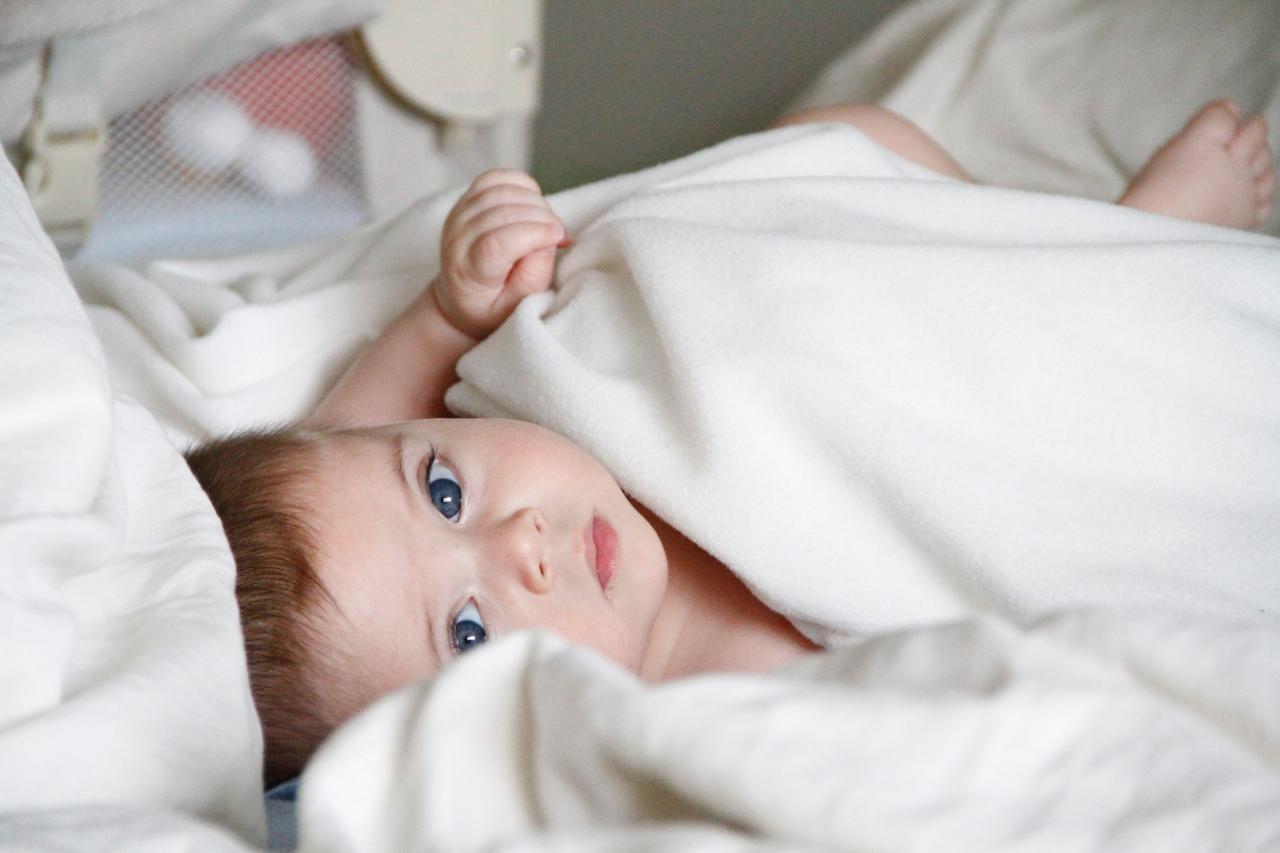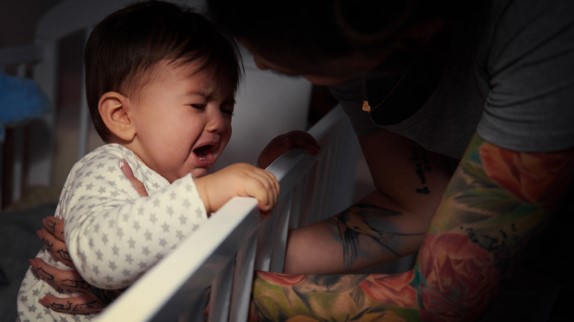Early morning wakes aren’t something you just have to live with as a parent with a new baby. You can actually get your baby to wake up at a much more reasonable hour with a few small changes.
You probably don’t want to wake up at 4 am or 5 am every day if you don’t have to. And believe it or not, neither does your baby. It’s most likely only happening because they’ve fallen into a pattern where this is their current ‘normal’. However it’s quite easy to change once you understand the cause.

Why Are Babies Easy to Wake Up in the Early Morning?
Let’s start with why the habit of early morning wakes often feels impossible to break. The problem is that once a baby wakes up between 4 am or 5 am in the morning, it is near impossible to get them to go back to sleep. And this is because of three factors.
- Their sleep pressure which is one of the driving factors for sleep is low as they have just had 8-10 hours of sleep.
- As the sun rises in the early morning, the baby’s melatonin level starts to drop, and this tells their body that it’s actually time to wake up.
- Sleep is also very, very light in the early hours of the morning, which means that it’s easier for a baby to accidentally be woken up by environmental noises, hunger, or just general discomfort from a wet diaper.
So although your baby may need more sleep, all of these factors are actually encouraging them to wake up early.
How to Fix an Early Morning Waking Habit?
To fix an early morning waking habit, you need to try and address each of these factors.
Tip 1. Following an age-appropriate schedule.
Following an age-appropriate schedule will ensure that your baby is not sleeping too long during the day, and therefore has enough sleep pressure to stay asleep for 10 to 12 hours at night. If your baby is not following an age-appropriate sleep schedule, they may be sleeping too much during the day, which, in turn, reduces the amount of nighttime sleep they actually need, which means that they’re going to wake early.
So, for example, if your baby is 11 months of age, their total sleep requirement over 24 hours is generally 13 hours. But if they’re sleeping for four hours during the day, then they only need to sleep for a maximum of nine hours overnight, which means if they go to bed at 7:00 pm at night, then no matter what you do, they’re going to wake at 4:00 am because they’ve had their nine hours of sleep. Ensuring that your baby is following an age-appropriate sleep schedule will mean that your baby has enough sleep pressure that they will sleep from 8 pm or 7 pm at night all the way till 6:00 am in the morning.
In addition to adopting an age-appropriate schedule, when your little one does wake in the early hours of the morning.
Tip 2 Treat early morning wakes like night time wakes.

Treat it like it’s nighttime waking. And by that, I mean you keep the room dark, and quiet, and stay in bed until the desired wake up time. At all costs, you want to avoid starting your day at 4 am or 5 am in the morning, because you don’t want to accidentally encourage your baby to develop an early morning wake up habit, which will happen if you start your day too early. So for example, if you have a nine-month-old baby who
wakes at 4 am and you start your day at this point, you are going to notice that after being awake for two hours, they need their first nap. And after sleeping for 1.5 hours, they’ll wake up from that first nap at 7:30 am in the morning. Then, after being awake for three hours, they’re going to be ready for their second nap, which means at 10:30 am in the morning, they’re going down for their second nap, sleeping for 1.5 hours, and then waking at 12:00 pm.
As nine-month-olds can generally only stay awake for five hours following their second nap, that nine-month old is going to be ready for bedtime at 5 pm. And because nine-month-olds only sleep for around 11 hours at night max, they’re going to be ready to start their day at 4 am the next morning. And very quickly, you can see that the baby develops an early morning wake up habit.
So to ensure that you don’t accidentally create a habit of early morning wakes, when your baby does wake early in the morning, treat it like it is a nighttime wake until your desired wake up time.
Tip 3 Keep your baby’s bedroom dark until the desired wake up time.
It will limit your baby’s exposure to light in the morning. Because light exposure in the morning actually tells your baby’s internal clock that it’s time to wake up. In fact, if your baby were to wake up at 4:00 am or 5:00 am in the morning and you actually opened up their blinds and turned on the lights, you are actually unintentionally resetting their circadian rhythm, and this will cause your baby to lock in that early wake up time. So to fix early morning wakes, make sure you keep your baby’s bedroom dark by using black-out blinds and keeping night lights off until that desired wake up time.
It is also really important to minimize household and neighborhood noises in the early morning hours, because we know that babies’ sleep in those early morning hours is very, very light.
Tip 4 Limit Environmental Noises.
These household noises and neighborhood noises, like the garbage truck rumbling down the street or birds chirping, can easily wake a baby up at 4:00 or 5:00 in the morning. And then they’re going to find it really difficult to go back to sleep. So to ensure your baby doesn’t accidentally wake up due to these environmental noises, think about using a white noise machine to help mask these noises and prevent those early morning wakes.
Since the maximum volume on white noise machines can actually exceed the recommended noise level for children, and have the potential to lead to noise-induced hearing loss, it’s really important that you minimize the risk by keeping the volume of the white noise machine below that maximum level, and placing that white noise machine at least 6.5 feet or 200 centimeters away from your baby’s sleep space.
Tip 5 Help your baby learn to fall asleep independently.
During the night, babies have multiple sleep cycles and partially wake up between each cycle. If they have learned to fall asleep independently, they will simply fall back asleep between these sleep cycles.
But, if they rely on an adult to rock, feed, or hold them, or replace a pacifier to fall back to sleep, then they are going to wake up fully between sleep cycles and then want your help to fall back to sleep. For babies who require an adult to fall back to sleep, they typically sleep well at the beginning part of the night because their sleep drive is high and their internal clock is telling them to go to sleep.
However, as the night progresses, their sleep pressure dissipates and their internal clocks switch from telling them to go to sleep, to wake up. So they start to wake more frequently during the early mornings, and call out to an adult to help them fall back to sleep. For example, if your baby needs your help to fall asleep, they may go to bed easily at 7 pm at night, and then they might wake at 1 am, 3 am and 5 am. Now, you may be able to convince your baby to go back to sleep when they wake at 1 am and 3 am because there’s enough sleep pressure to fall back asleep. However, at 5 am, it’s going to be impossible to convince them to go back to sleep because their sleep pressure is low, as they’ve just had that 10 hours of sleep and their body clock is telling them that it’s time to wake up. And that is exactly what they will do.

So you can see being able to fall asleep at bedtime and back to sleep at night waking throughout the night is actually a vital skill in conquering those early morning wake ups.

